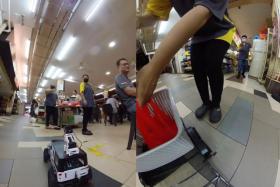Ericsson and Nokia to power Singapore's 5G network
Network operators Singtel and the StarHub-M1 consortium finalise vendors
Technologies from Sweden's Ericsson and Finland's Nokia will power the core of Singapore's two nationwide 5G networks, forming the backbone of its digital economy.
The two firms will be the key vendors for Singtel and a joint venture between StarHub and M1, which won the rights to build the two nationwide 5G networks, the telcos announced yesterday.
The telcos have to blanket the whole island with 5G connectivity by 2025, bringing Singapore one step closer to a future of driverless vehicles, on-the-go cloud gaming, and robot-run factories and ports.
TPG Telecom did not win the nationwide 5G licence, but it will be allowed to operate smaller 5G networks that provide spot coverage using airwaves that are in abundance.
TPG has selected China's Huawei as its key vendor.
Sector regulator Infocomm Media Development Authority (IMDA) issued the final awards to the four telcos yesterday, following a rigorous review of their business proposals in a regulatory process known as call for proposal (CFP).
At a virtual press briefing, Communications and Information Minister S. Iswaran said: "The final award sets the stage for the development of a world-class, resilient and secure 5G infrastructure, which is going to be the backbone of Singapore's digital economy."
Singtel will be using Ericsson for the core components of its network, while StarHub and M1 have selected Nokia to supply core equipment.
StarHub is also exploring using Nokia and Chinese firms Huawei and ZTE for other network elements, whereas M1 is reviewing Ericsson, Nokia and Huawei.
"Our CFP process did not exclude any vendor... the emphasis was on security, resilience and performance," Mr Iswaran said.
BILLIONS
The telcos had run a rigorous selection process based on their commercial and technical requirements, resulting in a good diversity of vendors participating in different parts of Singapore's 5G ecosystem, he said.
The telcos are expected to invest billions of dollars to roll out the 5G infrastructure over the next 15 years of their licence.
Advanced 5G technologies promise surfing speeds 20 times faster than what 4G networks offer and the ability to connect 1,000 times as many devices.
They are also better able to support mission-critical applications, such as driverless car navigation and remote surgery requiring a constant connection without lag.
Mr Iswaran did not rule out possible network roll-out delays due to the Covid-19 pandemic affecting supply chains and workforce availability.
"But as of now, we have no indication that it would be the case," he said.
The original timelines to cover half the island with 5G signals by end-2022, and the entire island by 2025, still apply.
Beyond the nationwide coverage, there are smaller 5G networks which use shorter-range millimetre airwaves that are in abundance here; these networks can be rolled out as early as this year.
Singtel, StarHub and M1 will each get millimetre airwaves to operate smaller 5G networks in addition to their nationwide networks.
To support the 5G ecosystem here, IMDA will be launching its 5G Living Lab@Pixel in one-north in September to allow start-ups to develop and test 5G applications.
In the mid-term, Mr Iswaran expects job prospects to remain strong in the infocomm sector even though the pandemic may dampen demand in the short term.
"Because every sector is going to adapt and digitalise, 5G, for example, is going to be an important enabler for certain sectors, as a start," he said.
ADDTIONAL REPORTING: LESTER WONG
Get The New Paper on your phone with the free TNP app. Download from the Apple App Store or Google Play Store now


